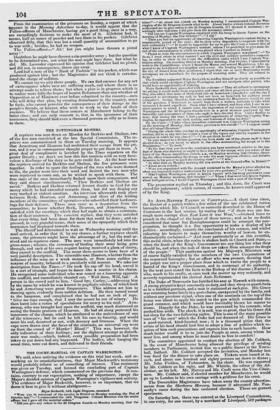THE NOTTINGHAM RIOTERS.
A reprieve was sent down on Monday for Berkins and Shelton, two of the five men convicted at the late Special Commission. The re- prieve was communicated to them on Tuesday morning. It appears that Armstrong and Hearson had meditated their escape from the pri- son, and it was in consequence thought proper to put them in irons. A great deal of compliment is lavished by the Times reporters on the gaoler Briarly ; we don't see bow this fact consists with so very bene- volent a discharge of his duty as he gets credit for. At the hour when the reprieve arrived for Berkins and Shelton, the five prisoners were together. In order to spare the feelings of the men who were doomed to die, the gaoler went into their ward and desired the two men who were reprieved to come out, as he wished to speak with them. The true state of the case immediately flashed upon their companions, and they said almost simultaneously, " Then Berkins and Shelton are saved." Berkins and Shelton returned fervent thanks to God for the mercy which he had extended towards them, but did not display any very marked or violent emotion. An interview afterwards took place between Beck, Hearson, and Armstrong, and three of the leading members of the committee of operatives who subscribed their hard earn- ings for their defence. These men came as a deputation from the committee, to know whether Beck, Hearse'', and Armstrong, were satisfied with the exertions which they had made to obtain a commuta- tion of their sentence. The convicts replied, that they were satisfied that every thing had been done for them that could be done ; and ex- pressed, in very grateful terms, their sense of the sympathy which their townsmen had displayed towards them.
The Sheriff had determined to wait on Wednesday morning until the mail arrived, in order that if, by any chance, a further reprieve should come, the prisoners might have the advantage of it ; but the mail ar- rived and no reprieve came. The men were immediately led into the press-room ; whence, the ceremony of binding their arms being gone through, and each at his own request having received a glass of sherry, they passed to the scaffold. The scene there seems to have been of a very painful description. The miserable man Hearson, whether from the influence of the wine on a weak stomach, or from some sudden pa- roxysm of insanity, behaved in a peculiarly wild manner. We take our description from the Titne,s—" He took his cap off his head, waved it in a sort of triumph, and began to dance like a maniac in his chains. Ile recognized some individual who was seated on a housetop opposite the scaffold, and immediately shouted out, 'Well done, Will, lad.' A person in the crowd said to him, 'Good bye, Curley,'--addressing him by the name by which he was known in pugilistic circles, of which both le and Armstrong were great frequenters. This address set him to dancing again, evidently from sudden delirium. He then turned round to the hangman, and complained that he had not an inch of rope. Give me rope enough, that I may the sooner be out of misery.' He then burst into a series of ejaculations for mercy to his soul." Arm- strong, who was brought last upon the scaffold, was much distressed on seeing the frantic gestures of Hearson. He had all along protested his innocence of the charge, which he attributed to the malevolence of one of the witnesses ; but he said he left his rase to futurity, and would meet his end, deserved or not, with decency and firmness. When the caps were drawn over the faces of the criminals, an universal cry went
up from the crowd of " Murder ! Blood !" This was, however, the only indication of their feelings ; not the slightest attempt at disturb- ance was made,—which, indeed, every possible preparation had been taken to put down had any happened. The bodies, after hanging the usual time, were cut down, and delivered to their friends.


























 Previous page
Previous page